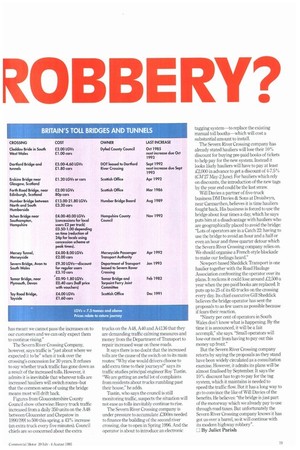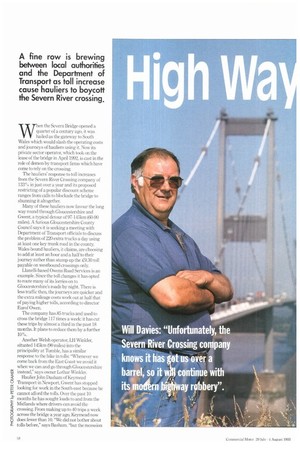IZ01313 R y ?
Page 21

Page 20

If you've noticed an error in this article please click here to report it so we can fix it.
A fine row is brewing between local authorities and the Department of Transport as toll increase cause hauliers to boycott the Severn River crossing.
When the Severn Bridge opened a quarter of a century ago, it was hailed as the gateway to South Wales which would slash the operating costs and journeys of hauliers using it. Now its private sector operator, which took on the lease of the bridge in April 1992, is cast in the role of demon by transport firms which have come to rely on the crossing.
The hauliers' response to toll increases from the Severn River Crossing company of 133% in just over a year and its proposed restricting of a popular discount scheme ranges from calls to blockade the bridge to shunning it altogether.
Many of these hauliers now favour the long way round through Gloucestershire and Gwent, a typical detour of 97-145km (60-90 miles). A furious Gloucestershire County Council says it is seeking a meeting with Department of Transport officials to discuss the problem of 220 extra trucks a day using at least one key trunk road in the county. Wales-bound hauliers, it claims, are choosing to add at least an hour and a half to their journey rather than stump up the £9.30 toll payable on westbound crossings only.
Llanelli-based Owens Road Services is an example. Since the toll changes it has opted to route many of its lorries on to Gloucestershire's roads by night. There is less traffic then, the journeys are quicker and the extra mileage casts work out at half that of paying higher tolls, according to director Eurof Owen.
The company has 85 trucks and used to CTOSS the bridge 117 times a week: it has cut these trips by almost a third in the past 18 months. It plans to reduce them by a further 10%.
Another Welsh operator, LH Winkler, situated 145km (90 miles) into the principality at Tumble, has a similar response to the hike in tolls: "Whenever we come back from the East Coast we avoid it when we can and go through Gloucestershire instead," says owner Lothar Winkler.
Haulier John Dasham of Keymead Transport in Newport, Gwent has stopped looking for work in the South-east because he cannot afford the tolls. Over the past 10 months he has sought loads to and from the Midlands where drivers can avoid the crossing. From making up to 40 trips a week across the bridge a year ago, Keymead now does fewer than 10. "We did not bother about tolls before," says Basham. "hut the recession has meant we cannot pass the increases on to our customers and we can only expect them to continue rising."
The Severn River Crossing Company, however, says traffic is "just about where we expected it to be" when it took over the crossing's concession for 30 years. It refuses to say whether truck traffic has gone down as a result of the increased tolls. However, it admits it is inevitable that wherever tolls are increased hauliers will switch routes–but that the common sense of using the bridge means most will drift back Figures from Gloucestershire County Council show otherwise: Heavy truck traffic increased from a daily 350 units on the M8 between Gloucester and Chepstow in 1990/1991 to 500 this spring, a 43% increase (an extra truck every five minutes). Council chiefs are so concerned about the extra trucks on the A48, A40 and A4136 that they are demanding traffic calming measures and money from the Department of Transport to repair increased wear on these roads.
It says there is no doubt that the increased tolls are the cause of the switch on to its main routes: "Why else would drivers choose to add extra time to their journeys?" says its traffic studies principal engineer Roy Tustin. "We are getting an awful lot of complaints from residents about trucks rumbling past their house," he adds.
Tustin, who says the council is still monitoring traffic, suspects the situation will not ease as tolls inevitably continue to rise.
The Severn River Crossing company is under pressure to accumulate £300m needed to finance the building of the second river crossing, due to open in Spring 1996. And the operator is about to introduce an electronic tagging system—to replace the existing manual toll booths—which will cost a substantial amount to install.
The Severn River Crossing company has already stated hauliers will lose their 10% discount for buying pre-paid books of tickets to help pay for the new system. Instead it looks likely hauliers will have to pay at least £2,000 in advance to get a discount of 4-7.5% (CM 27 May-2 June). For hauliers which rely on discounts, the introduction of the new tags by the year end could be the last straw.
Will Davies a partner of five-truck business DM Davies & Sons at Droislwyn, near Carmarthen, believes it is time hauliers fought back. His business is forced to use the bridge about four times a day, which he says puts him at a disadvantage with hauliers who are geographically placed to avoid the bridge: "Lots of operators are in a Catch 22: having to use the bridge to avoid an hour and a half or even an hour and three quarter detour which the Severn River Crossing company relies on. We should organise a French-style blockade to make our feelings heard."
Newport-based Sheddick Transport is one haulier together with the Road Haulage Association confronting the operator over its plans. It reckons it could lose around £2,500 a year when the pre-paid books are replaced. It puts up to 25 of its 65 trucks on the crossing every day. Its chief executive Gill Sheddick believes the bridge operator has sent the proposals to as few users as possible because if fears their reaction.
"Ninety per cent of operators in South Wales don't know what is happening By the time it is announced, it will be a fait accompli," she says. "Small operators will lose out most from having to pay out this money up front."
But the Severn River Crossing company retorts by saying the proposals as they stand have been widely circulated as a consultation exercise. However, it admits its plans will be almost finalised by September. It says the 10% discount has to go to pay for the tag system, which it maintains is needed to speed the traffic flow. But it has a long way to go to convince the like of Will Davies of the benefits. He believes: "the bridge is just part of the motorway which we already pay to use through road taxes. But unfortunately the Severn River Crossing company knows it has got us over a barrel, so it will continue with its modern highway robbery".
Li By Juliet Parish








































































